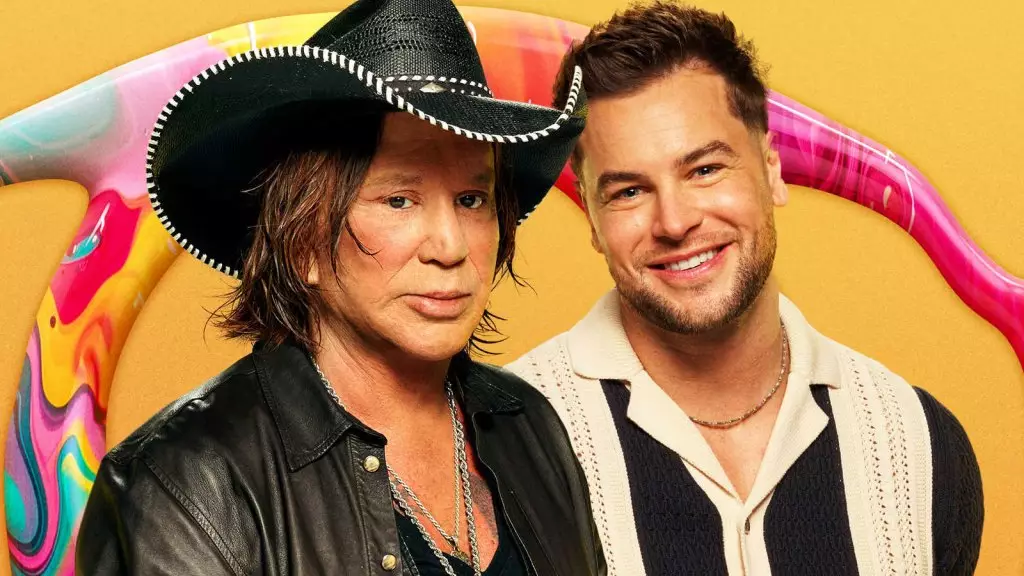In the tumultuous world of reality television, where personalities clash and raw emotions are laid bare, a recent incident involving actor Mickey Rourke has thrust him into the spotlight for all the wrong reasons. During a pirate-themed challenge on the UK version of Celebrity Big Brother, Rourke unleashed a tirade of aggressive language towards his housemate Chris Hughes. A playful joke spiraled into volcanic anger, with Rourke’s threats echoing within the confines of the house. “You looking at me? Don’t eyeball me,” he barked, before escalating his retaliation with terms that were both inappropriate and shocking. This wasn’t just a momentary lapse of judgment; it was a clear illustration of how fragile the dynamics within reality TV can be when moderated behavior crumbles under pressure.
Escalation and Consequences
What transpired between Rourke and Hughes is indicative of a larger problem that plagues such environments: the struggle between authenticity and accountability. While reality TV is marketed as a raw reflection of everyday conflicts, the extremities often witnessed are anything but ordinary. Rourke’s language not only violated the standard of acceptable behavior expected in the house but also highlighted an alarming tendency among certain participants to dismiss the feelings of others in the name of entertainment.
This incident echoed throughout the Big Brother community, culminating in Rourke being called to the Diary Room by Big Brother himself, a move emblematic of the tightrope the show must walk between maintaining excitement and upholding a moral code. His eventual removal was not merely a punishment but a firm statement: threatening and inappropriate language have no place in their narrative. The producers of reality shows have a responsibility not just to the individuals within the house, but to the broader audience that consumes their content, which is why Rourke’s actions could not go unaddressed.
Rourke’s Response and Personal Accountability
Faced with the repercussions of his aggression, Rourke navigated his exit with a surprising mix of regret and defiance. In a reflective moment, he admitted to his short fuse and expressed shame, stating, “I know I upset a lot of people out there.” This acknowledgment of wrongdoing is crucial, as it reveals an understanding that actions have consequences, which is a valuable lesson in any context, entertainment or otherwise. However, the sincerity of his apologies remains dubious when juxtaposed with his earlier behavior. He seemed to trivialize his actions, referring to them as “talking smack,” which poses the question: does he fully comprehend the impact of his words on others?
Rourke’s previous warnings regarding his language, including an earlier incident where he used a homophobic slur towards JoJo Siwa, cast a shadow over his attempts at making amends. The cycle of poor behavior and regret only highlights the need for accountability and introspection in high-pressure situations. This ongoing struggle raises valid concerns about whether participants in reality TV are equipped emotionally to handle the scrutiny of being in the public eye. Can someone who struggles with self-control truly thrive in the cutthroat environment of reality television?
The Larger Narrative: Reality TV and Responsibility
Mickey Rourke’s tumultuous stint in the Celebrity Big Brother house serves as a stark reminder of the fine line between entertainment and irresponsibility. Reality television thrives on conflict, but what happens when that conflict tips into aggression? The producers of shows like Big Brother must contend with this challenge regularly. They have an obligation to ensure that while viewers are entertained, they are not encouraged to normalize inappropriate behavior that could harm others.
Moreover, Rourke’s experience raises critical questions about celebrity culture. Is his behavior a reflection of a larger societal trend where aggressive masculinity is often excused in the name of entertainment? As viewers, we must navigate our fascination with reality television while demanding responsibility from its participants. The question then becomes whether we can enjoy these shows without endorsing the toxic behaviors they sometimes portray.
In the wake of Rourke’s exit, the broader implications of his behavior continue to resonate. Reality television, despite its faults, has the potential to spark important conversations about self-regulation, accountability, and the nature of fame. Rourke’s story is not just one of conflict; it is a reminder of the human capacity for growth and the paramount importance of understanding the impact of our words and actions. As we tune into Celebrity Big Brother, we must reflect on these very issues, considering not just the entertainment but the values we wish to endorse as a society.

